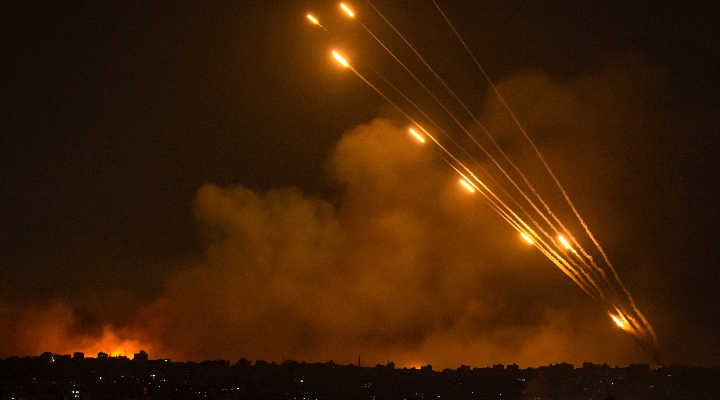
There were no huge sell-offs on international stock markets in the wake of Hamas's attack on Israel. Oil prices, however, rose, while the dollar strengthened. Investors are now looking beyond the short term to understand what the consequences of a lasting conflict might be.
Strategists and portfolio managers have turned their attention to the following:
1) Geopolitical dynamics;
2) The oil price impact;
3) Where the "safe havens" are.
Geopolitical Dynamics
"The attack came while talks between Saudi [Arabia] and Israel had been underway for some time with the participation of the USA, with the formal aim of achieving recognition of Israel by Saudi," says Antonio Cesarano, global chief strategist at Intermonte.
"In exchange, Saudi Arabia sought to obtain a greater guarantee of coverage of its security needs – also in view of the progressive easing of US involvement in the region – as well as access to Israeli technologies for the development, among other things, of nuclear power civil use. All in the context of the Arab Vision 2030 plan, which aims to reduce dependence on oil revenues.
"The Hamas attack calls into question the potential Arab-Israeli agreement, [and] at least for the moment puts it on the back burner".
Many observers now fear there could be another escalation to the conflict involving other nations.
"The invasion of southern Israel, while an explosion of a long-running regional conflict and humanitarian crisis, has the potential to expand into a protracted conflict, which has historically been a headwind for global stock markets," comments Norman Villamin, group chief strategist of Union Bancaire Privée (UBP).
He now believes that "the risk that the largest incursion into Israel since 1973 will transform from a localised event to a prolonged conflict involving a greater number of countries (including Iran) should be among investors' main concerns."
The Oil Price Impact
Oil began to rise again in the aftermath of the Hamas attack due to fears of the involvement of other countries in the conflict. Crude oil prices fell last week due to turbulence in financial markets, the potential slowdown in demand and expectations of a possible agreement between Israel and Saudi Arabia.
"The Hamas attack has clearly put an end to this development. Tehran's support for Hamas could lead to an Israeli attack on Iran. Furthermore, we are unlikely to see a further thaw in US-Iran relations and Iran's ability to expand oil production will be called into question," explains Nitesh Shah, head of commodities and macroeconomic research at WisdomTree.
The Race For Safe Havens
The dollar index, which measures the value of USD against a basket of foreign currencies, strengthened above 106 on Monday, 9 October, interrupting a three-day decline as investors sought protection in safe-haven assets.
"Thanks to the Fed's monetary tightening and the resilience of the US economy, the dollar has already risen by 2.1% this year," explains Richard Flax, chief investment officer at Moneyfarm. He adds that, together with gold and oil, the dollar is among "three key indicators to keep under careful observation in the coming weeks.”
As for gold, Shah points out that the it enjoys a solid reputation as a geopolitical hedge, even if price movements often dissipate quickly. However, occasionally price gains persist and are very significant, such as in the Yom Kippur War 50 years ago, when gold prices rose more than 47% within a year of the event.
How Are Portfolio Managers and Strategist Investing?
This latest attack in the Middle East comes at a time of already-elevated geopolitical tensions, with the ongoing war against Ukraine and the intense geopolitical rivalry between the US and China.
"Simultaneously, markets face a period of moderating global economic growth. Against this backdrop, we continue to prefer fixed income to equities. We see a better risk-reward profile for fixed income, and we recommend investors consider buying high-quality bonds in the 5–10-year maturity range," says Mark Haefele, chief investment officer at UBS Global Wealth Management.
Benjamin Melman, global CIO, asset management, at Edmond de Rothschild Asset Management, admits that, for the moment there is no reason to change the positioning in terms of asset allocation, but adds:
"No one can say whether the response will be similar to those seen in the past or whether the mere shock of what has happened could lead to the extension of the conflict. As a result, it makes sense to apply a risk premium to the markets."
Finally, Filippo Diodovich, senior market strategist at IG Italia, believes volatility could remain very high in the coming days and that "the impact on the markets will be increasingly profound if other states get involved, leading to risk aversion and to a risk-off sentiment that could last for a long time.
"As such, the destabilisation of the Middle East brings strong upward pressure on oil prices and pushes investors to towards safer assets like bonds, the dollar, the Swiss franc, the yen, and gold."


























